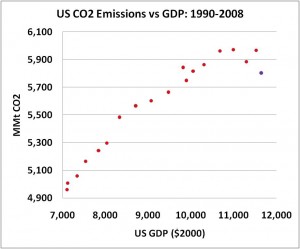US CO2 versus GDP 1990 to 2008
May 20th, 2009Posted by: Roger Pielke, Jr.
Data is now available from EIA and BEA to allow for a preliminary assessment of US carbon dioxide emissions in relation to economic growth (h/t JJ). US GDP grew by 1.1% while carbon dioxide emissions decreased by 2.8%. Now if the rate of emissions reductions can be doubled while economic growth is tripled, and we can sustain that for about 40 years, we might be on to something.

May 20th, 2009 at 1:47 pm
The reason for the drop in 2008 relative to GDP is relatively simple. $4 a gallon prices for gasoline and even higher prices for aviation fuel and diesel fuel diminish demand for those fuels. Less fuel use equals less carbon dioxide.
I think that a major problem with the current cap and trade proposal (let’s assume that it was needed) is that it tries a complex approach and complex measurements rather than a simple approach. The complex approach is for each utility and manufacturer to calculate their CO2 and pay a tax based on the carbon. The simple approach to reducing emissions, which should work based on the 2008 data, is to put a $2 per gallon tax on gasoline, heating oil and diesel fuel. Do the same thing that every other oil importing country does.
Now I would argue that economically if I did this, the CAFE standards would be unnecessary and the CO2 standards would be unnecessary (supposing that they are necessary).
Now this tax could be phased in over five or even ten years. (Toyota has suggested this approach.) In this way, the public shifts to buying fuel efficient vehicles and trucks. Or cars that are cleaner burning such as CNG vehicles. More people shift to CNG, a cleaner fuel with respect to CO2. And, the economic benefit is that as we saw in 2008, the higher the price of fuel goes, the less demand there is for gasoline. So this should trigger a lower price of oil because you are taxing it.
May 21st, 2009 at 8:37 am
David E you hit the nail on the head. As much as I would not want to pay $4 or $5 per gallon of gas, this seems to me the only approach that will get a large percentage of the car buying market interested in all the fuel efficient cars that will come out of the new fuel efficiency ratings.
May 21st, 2009 at 8:05 pm
It also should be said that a gasoline, heating oil, diesel fuel and airline fuel tax would be politically neutral. A major problem with the current bill is that its just bad policy. The government is effectively providing a cost advantage to companies that receive the allotments.
And then under the bill, we tax a competitor of that favored company because their country did not impose a high enough carbon tax on a product even though we didn’t either because the domestic competitor received an allotment.